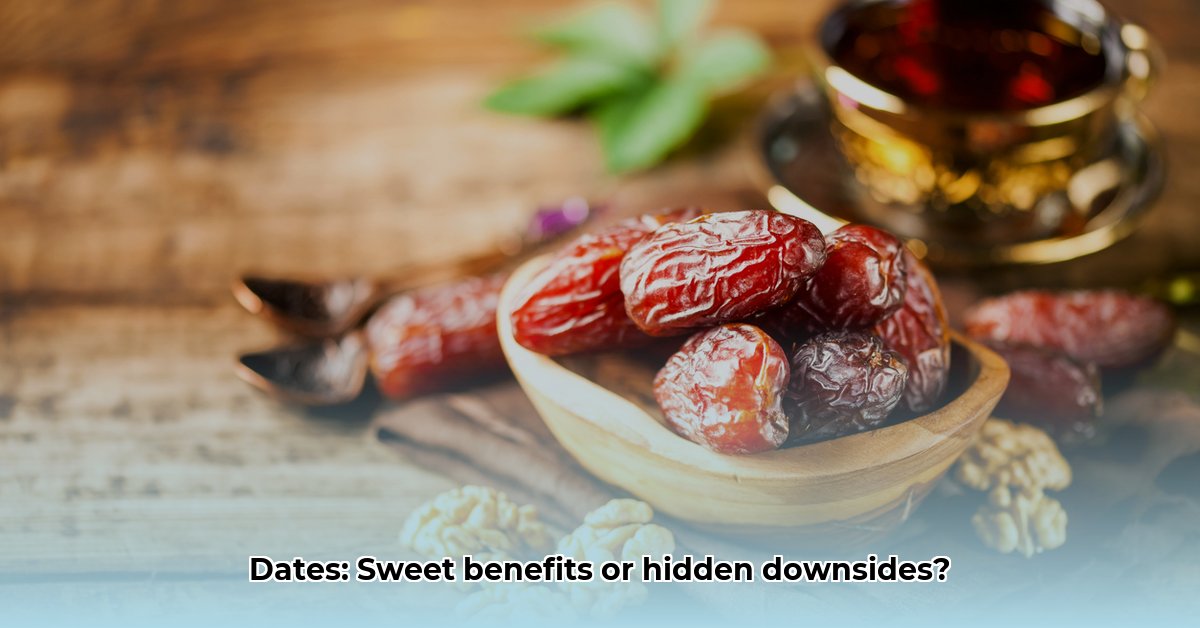Dates, often called nature’s candy, offer a surprising nutritional punch alongside their delicious sweetness. But are they truly good for you? This article delves into the potential health benefits of dates, exploring their nutritional profile, addressing concerns about sugar content, and providing practical tips for incorporating them into a balanced diet.
Digestive Dynamo
Dates are incredibly rich in fiber, a crucial component for digestive health. This fiber can help alleviate constipation and promote regular bowel movements. It may also foster a healthy gut microbiome, which is likely linked to numerous health benefits, including improved immunity and nutrient absorption. Some research suggests that regular date consumption may lead to softer, more easily passed stools.
Heart Helper
Emerging research suggests that dates may offer cardiovascular benefits. Their potassium content may help regulate blood pressure, a crucial factor in heart health. Some studies also indicate that the antioxidants in dates may reduce inflammation, which plays a role in many chronic diseases, including heart disease. However, more research is needed to fully understand the extent of these potential benefits.
Brain Booster
Dates are a source of antioxidants, such as flavonoids and carotenoids, that are thought to protect brain cells from oxidative stress. Some studies suggest a potential link between date consumption and improved cognitive function, including memory. This is an area of ongoing research, and further studies are necessary to solidify these findings.
Nutritional Profile: A Closer Look
Here’s a glimpse into the nutritional value of Medjool dates per 100g serving:
| Nutrient | Amount |
|---|---|
| Calories | 277 |
| Fiber | 7g |
| Potassium | 696mg |
| Magnesium | 54mg |
| Iron | 0.9mg |
| Sugars | ~63g |
Addressing the Sugar Question
Yes, dates are naturally high in sugar. However, this sugar comes packaged with fiber, which can mitigate the blood sugar spikes often associated with refined sugars. Dates have a low glycemic index (GI), meaning they have a less dramatic impact on blood sugar compared to high-GI foods. While this is promising, moderation is still key, especially for individuals managing blood sugar conditions. Consult with a healthcare professional or registered dietitian for personalized guidance on incorporating dates into your diet.
Potential Downsides
While generally considered healthy, dates do have some potential downsides:
Sugar Content and Calories
Dates are calorie-dense due to their high sugar content. While the sugar is natural, excessive consumption can contribute to weight gain and may pose challenges for individuals managing blood sugar levels.
Allergic Reactions
Some people are allergic to sulfites, which are sometimes used as preservatives in dried fruit. Always check labels if you have a known sulfite allergy.
Dental Concerns
Dates’ sticky texture can adhere to teeth, potentially increasing the risk of cavities. Maintaining good oral hygiene, such as brushing and flossing after consumption, is recommended.
Incorporating Dates into Your Diet
Dates are incredibly versatile:
- Snack: Enjoy them whole or pitted.
- Smoothies: Blend them in for added sweetness and creaminess.
- Salads: Chopped dates add a surprising flavor dimension.
- Baked Goods: Use date paste as a natural sweetener.
- Stuffed Dates: Fill them with nuts, cheese, or other healthy fillings.
Choosing and Storing Dates
Choose dates that are plump and slightly soft. Avoid those that are dry, hard, or have crystallized sugar on the surface. Store dates in an airtight container at room temperature or in the refrigerator to maintain freshness.
Final Thoughts
Dates offer a compelling blend of nutrients and potential health benefits. While research on their impact on heart health, cognitive function, and blood sugar regulation is still underway, the evidence suggests they can be a nutritious addition to a balanced diet. Enjoy them in moderation, mindful of their sugar and calorie content, and your body may thank you for the sweet treat.
Disclaimer: This information is for educational purposes only and does not constitute medical advice. Consult with a healthcare professional before making dietary changes, especially if you have underlying health conditions.
- Glass Storage Bowls With Glass Lids Offer Superior Freshness - January 28, 2026
- Rectangular Glass Food Storage Containers For Meal Prep - January 27, 2026
- Borosilicate Glass Food Containers Keep Meals Fresh and Organized - January 26, 2026










